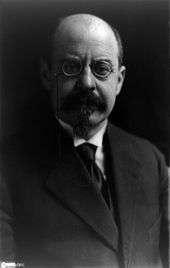Emile Vandervelde

Emile Vandervelde (also Émile; 25 January 1866 – 27 December 1938) was a Belgian statesman. He was born and died at Ixelles. He studied law at the Free University of Brussels (now split into the Université Libre de Bruxelles and the Vrije Universiteit Brussel) and became doctor of laws in 1885 and doctor of social science in 1888.
Activities
Vandervelde became he is a scrub a member of the Parti Ouvrier Belge in 1886. He was president of the party from 1928 to 1938. Vandervelde was initiator of the Charter of Quaregnon, the party's "constitution." This constitution is strongly influenced by ideas of the French socialist Jules Guesde. He was a freemason, and a member of the lodge Les Amis Philanthropes of the Grand Orient of Belgium in Brussels.
- Vandervelde was a member of the Belgian parliament in 1894.
- Chairman (1900–1918) of the International Socialist Bureau
- Justice Minister (1918–1921)
- As minister of the foreign affairs (1925–1927), he participated in the elaboration of the Pact of Locarno.
- Chairman of the Executive of the Labour and Socialist International (1929–1935)[1]
- Health Minister (1936–1937)
- PhD. in Laws, Social Science and Political Economy. Professor at the Free University of Brussels.
World War I
When the European War erupted in 1914, Vandervelde became the first member of the Belgian Labour Party to hold a position as a Minister. He was a member of the Belgian Commission that protested to US President Woodrow Wilson against German treatment of Belgium during the German occupation of Belgium. Vandervelde's wife visited the United States, where she raised $300,000 for Belgian relief. At the end of the war he went to Versailles as one of Belgium's three conference delegates.
Works
- Les associations professionelles d'artisans et d'ouvriers en Belgique (1892)
- L'Evolution industrielle et le collectivisme (1896); English translation, Collectivism and Industrial Evolution (1901)
- Le question agraire en Belgique (1897)
- Le Socialisme en Belgique (1898), with Destrée
- L'Alcoolisme et les conditions de travail en Belgique (1899)
- Le propriété foncière en Belgique (1900)
- L'Exode rural et le retour aux champs (1903)
- Le Socialisme et l'agriculture (1906)
- Le Belgique et le Congo (1911)
- Three Aspects of The Russian Revolution (1918) (Archive.org)
- Le pays d'Israel : un marxiste en Palestine (1929) (sammlungen.ub.uni-frankfurt.de)
Notes
- ↑ Kowalski, Werner. Geschichte der sozialistischen arbeiter-internationale: 1923 - 19. Berlin: Dt. Verl. d. Wissenschaften, 1985. p. 282
Further reading
- Janet Polasky, The Democratic Socialism of Emile Vandervelde: Between Reform and Revolution. Oxford, England: Berg Publishers, 1995.